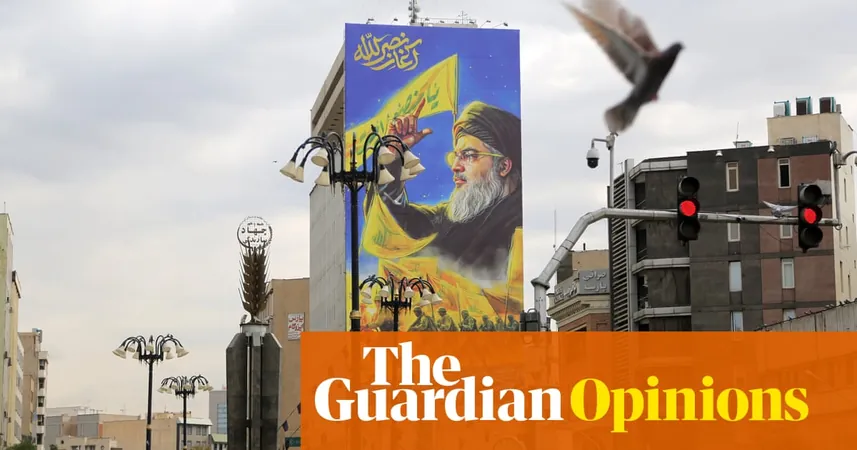
Iran's Dilemma: Navigating a Dangerous Game with Israel After Hezbollah's Loss
2024-09-30
Author: Kai
Introduction
Last week, tensions escalated in the Middle East after the Israeli airstrike that led to the death of Hezbollah leader Hassan Nasrallah—a significant blow to Iran and its regional allies. This incident is just the latest in a series of targeted assassinations aimed at key figures connected to the Iranian regime. In response, Iran's supreme leader, Ali Khamenei, issued a statement condemning the attack, labeling it an "atrocity" and claiming that Israel had not emerged victorious. He hinted that retribution would come, but notably refrained from making any direct threats against Israel, raising concerns in Tehran about Iran's perceived vulnerability.
Iran's Concerns
Several Iranian officials have voiced their fears that such Israeli actions indicate a growing boldness with little apprehension of retaliation, particularly when Iran has not decisively responded to previous provocations, such as the assassination of Hamas leader Ismail Haniyeh. Iranian MP Ali Motahari pointed out that this failure to act may have emboldened Israel in its recent strike against Hezbollah.
Military Limitations
The lack of a solid response can be attributed to Iran's precarious position. Despite a large arsenal, Iran grapples with several limitations when it comes to retaliatory action against Israel. The latter possesses a formidable conventional military, sophisticated cyber capabilities, and nuclear deterrence that puts additional pressure on Iran's decision-makers. Even military demonstrations, such as the missile and drone barrage launched by Iran earlier this year, have been calibrated to prevent further escalation.
Rational Decision-Making
This cautious approach may run counter to the perception of Iran as a nation driven by ideology and recklessness. Instead, Iran's leaders appear trapped in a rational decision-making loop, recognizing their diminishing capacity to leverage military force without risking catastrophic consequences. Khamenei is well aware that each confrontation with Israel chips away at Iran's military credibility and political clout, while its historical struggles create a complex narrative about national defense versus aggressive maneuvering.
The Impact of Sanctions and Unrest
Iran’s leadership has long promised security and stability to its citizens; yet, the ongoing U.S. sanctions and civil unrest—especially regarding women’s rights—have undermined this narrative. Against this backdrop, Khamenei has managed to avert war, even as regional chaos unfurls in neighboring countries.
Risks of Conflict with Israel
Should Iran be drawn into a conflict with Israel, it risks collapsing the political framework that has sustained Khamenei's regime for over three decades. The current strategy of restraint could be a double-edged sword. If leaders perceive Iran as unable or unwilling to protect its interests, the very foundation of its national policy could be called into question.
Hezbollah's Loss and Regional Implications
While Hezbollah remains a threat to Israel, its loss of a leader who was hesitant to escalate tensions shakes the region further. As Iranian leaders make their own aversion to conflict known, the prospects for peace appear increasingly bleak. During a recent UN General Assembly conference, Iranian President Masoud Pezeshkian emphasized that Iran would "put aside all [its] weapons" if Israel does the same—a proposition likely viewed as naïve by Israel, which maintains its military readiness as a deterrent.
Nuclear Weapons as a Deterrent?
Disturbingly, while Iran's missile and drone capabilities have failed to curtail Israeli action, some analysts suggest that the development of a nuclear weapon could serve to solidify Iran's defensive posture. As a threshold nuclear state, Iran has the technical means at its disposal to build a bomb, potentially restoring deterrence and providing leverage in future negotiations.
The Risks of Pursuing a Nuclear Option
However, pursuing a nuclear option carries significant risks. If Israel suspects Iran is advancing toward nuclear armament, it might launch a preemptive military strike, probably in coordination with the United States. Yet, experts warn that such a strike might not succeed in dismantling Iran's program, as the regime has the expertise to rebuild swiftly after any setback.
Conclusion
In light of recent events, the argument for Iran to pursue a nuclear weapon has intensified. But Khamenei's long-standing caution may inhibit movement toward this bold step. The complexities of rational decision-making often hinder even the most strategically minded leaders from taking the critical leaps necessary for national defense. As Iran finds itself at a historical crossroads fraught with uncertainty, the stakes have never been higher. The advantage now lies with those willing to make bold moves—will Iran take the plunge, or will it continue to play a cautious game in the shadow of an ever-threatening adversary?




 Brasil (PT)
Brasil (PT)
 Canada (EN)
Canada (EN)
 Chile (ES)
Chile (ES)
 España (ES)
España (ES)
 France (FR)
France (FR)
 Hong Kong (EN)
Hong Kong (EN)
 Italia (IT)
Italia (IT)
 日本 (JA)
日本 (JA)
 Magyarország (HU)
Magyarország (HU)
 Norge (NO)
Norge (NO)
 Polska (PL)
Polska (PL)
 Schweiz (DE)
Schweiz (DE)
 Singapore (EN)
Singapore (EN)
 Sverige (SV)
Sverige (SV)
 Suomi (FI)
Suomi (FI)
 Türkiye (TR)
Türkiye (TR)